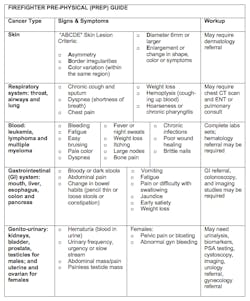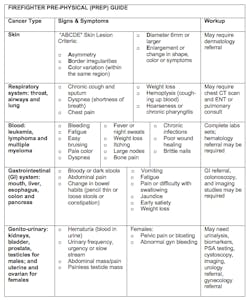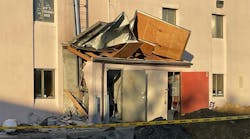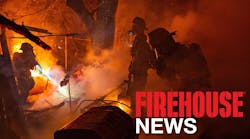The Firefighter Pre-Physical (PREP) Guide was developed in response to the frustrations expressed by many firefighters with their experiences attempting to obtain comprehensive cancer screenings. This letter to firefighters introduces the PREP Guide to directly address these genuine concerns. The PREP Guide is designed to help empower firefighters to more effectively advocate for the screenings they deserve. It is a practical and beneficial tool for early detection, intervention and prevention of high-risk occupational cancers.
Firefighter PREP Guide for Early Detection & Prevention of Occupational Cancers
Dear Firefighter:
In addition to your elevated risk for cardiovascular disease, well-researched government and university studies demonstrate that your occupation also puts you at significant risk for developing respiratory, gastrointestinal, genitourinary, skin and blood cancers. The Firefighter Pre-Physical (PREP) Guide is designed to better prepare you to obtain the necessary comprehensive screening tests from your primary care clinician to help prevent and detect these high-risk occupational illnesses.
Your primary care clinician may not be fully aware of your unique occupational health risks, and your health insurance plan may not automatically cover additional screening tests especially for younger firefighters. As a “high-risk” consumer of healthcare, you can overcome these challenges by utilizing the PREP Guide along with the Firefighter Comprehensive Physical Exam (CPE) template for your primary care provider. This will help to foster a stronger partnership with your primary care provider and more effectively advocate for the comprehensive screenings you deserve.
This PREP Guide will help you recall and document any concerning signs and symptoms of these particular high-risk occupational cancers. This list pictured, along with a thorough review of your job-related exposures, should be discussed and charted with your primary care clinician during the Review of Systems (ROS) questioning portion of the annual exam. This inquiry should help justify and facilitate more aggressive workups.
Fortunately, you can significantly help minimize your high risk for developing occupational cancer by being more proactive and practicing better self-care. This includes adhering to all cancer safety measures on the fireground and in the firehouse, eating healthy, exercising regularly, avoiding smoking, limiting alcohol consumption, and using sunblock. Additionally, completing this PREP Guide before arriving for your annual exam along with your CPE template is of utmost importance.
Sincerely,
Michael G. Hamrock, MD
Dr. Michael G. Hamrock is a former firefighter and department physician for the Boston Fire Department and now provides primary care to many Massachusetts firefighters at Steward St. Elizabeth’s Medical Center in Boston, MA.








